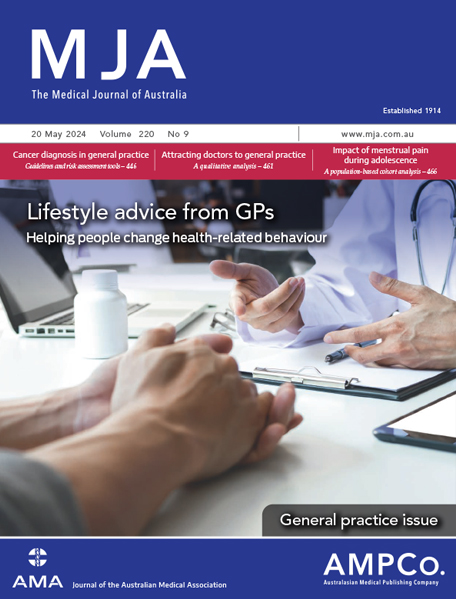The Medical Journal of Australia’s GP issue covers all things general practice, with several articles to help GPs navigate the landscape in 2024 and beyond.
General practitioners in 2024 face a unique set of challenges. Previously, InSight+ has discussed the decline in status of the sector, the way cost of living is affecting how GP clinics operate as well as the vital role GPs hold in promoting a healthy lifestyle, and prevention of and diagnosing medical conditions.
Recognising these challenges, the Medical Journal of Australia’s GP issue is out today. It covers all things general practice, with several articles to help GPs navigate the landscape in 2024 and beyond.

Some of the articles include:
General practice training recommendations
For many years, Australia has faced the challenge of not having enough GPs, especially in rural areas. This problem is becoming more acute as demand grows across both rural and urban regions.
Unfortunately, fewer Australian medical students are choosing careers in general practice, which exacerbates these shortages. Research from authors Nancy Sturman, Michael Tran and Sophie Vasiliadis includes a qualitative study that focused on the recommendations from a group discussion at a medical educator workshop.
The participants spoke about their experiences of GP training, and how they think more medical graduates could be persuaded to pursue a career in general practice.
The participants recommended increasing the number of student and junior doctor clinical placements in general practice and increasing exposure to GP teachers and educators.
As one participant said:
“[Junior doctor placements in general practice] would be a really good way of getting a bit of an idea of what general practice is like because it’s so, so different. And you have to really, at the moment, make quite a big decision to leave hospital medicine and start general practice without really knowing. It feels like a bit of a gamble in some ways… It’s one of the few specialties where you don’t get to be able to trial it.”
Other recommendations include improving GP trainee pay and entitlements and improving the integration of general practice and hospital patient care and professional relationships.
“My experience was that the hospital culture is quite disparaging of general practice, and medical students are particularly impressionable because it’s their first exposure to clinical medicine,” one participant said.
Although the participants saw many of the solutions to general practice as being out of their control, they were passionate about their role in the health of the nation.
As one participant said: “I love being a GP and I think I work at a really good practice and I had really good training support and colleagues… without GPs the whole health system will collapse.”
Read the research in this week’s MJA GP special issue.
Shortage of lifestyle advice from GPs
A survey of over 13 000 Australians revealed a significant gap in health advice from GPs.
A research letter from authors Loai Albarqouni, Hannah Greenwood, Caroline Dowsett and Paul P Glasziou explains how they analysed the secondary analysis of data collected by the 2020–21 National Health Survey.
They found that although many people would be more likely to adopt healthier behaviours if their GP recommended it, many survey respondents hadn’t received such advice.
The survey asked participants about their alcohol consumption, smoking habits, weight, physical activity and diet. They also asked whether their doctor had given them any advice about these points.
The survey found that only a small fraction of participants had received advice from their doctor: 27% of smokers were told to quit, only 8% of heavy drinkers were advised to cut back, and just 9% of those with poor diets were encouraged to eat more fruits and vegetables. Those who were given advice were more likely to make positive changes.
“As general practitioners may not have time to deliver brief lifestyle interventions for all their patients, interventions that prioritise effective lifestyle advice are needed,” the authors wrote.
Read the research letter in this week’s MJA GP special issue.
Current cancer guidelines and risk assessment tools in general practice
The special issue also covers the prevalence of GPs diagnosing cancers, with a perspective article stating that full-time GPs diagnose up to 12 cases of cancer each year although see patients with symptoms associated with cancer almost daily.
Authors Brent Venning and Jon D Emery spoke about how GPs walk a fine line between improving early cancer diagnosis and reducing overtesting, overdiagnosis and unwarranted variation.
“Excessive use of diagnostic tests such as computed tomography scans or excessive referrals for gastrointestinal endoscopy poses direct harms to patients, risks overdiagnosis, affects health service waiting lists and adds costs to patients and/or the health system. Conversely, over-relying on less invasive and lower cost investigations such as blood tests or x-rays can provide false reassurance and may prolong diagnostic intervals,” they wrote.
The authors summarised current tools and guidelines that are available to help GPs investigate potential cancer diagnoses. They also wrote about risk assessment and electronic clinical decision support tools being trialled overseas and in Australia.
The authors highlighted how fostering collaborative initiatives with GPs, researchers and cancer agencies can bridge the gap between theory knowledge and practical application.
“Through such concerted efforts, we can collectively strive towards the shared goal of enhancing cancer diagnosis within general practice,” they wrote.
Read the perspective in this week’s MJA GP special issue.
Subscribe to the free InSight+ weekly newsletter here. It is available to all readers, not just registered medical practitioners.

 more_vert
more_vert